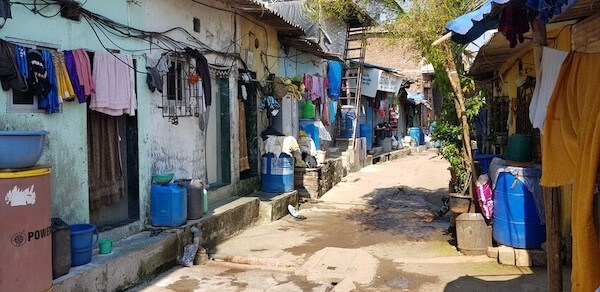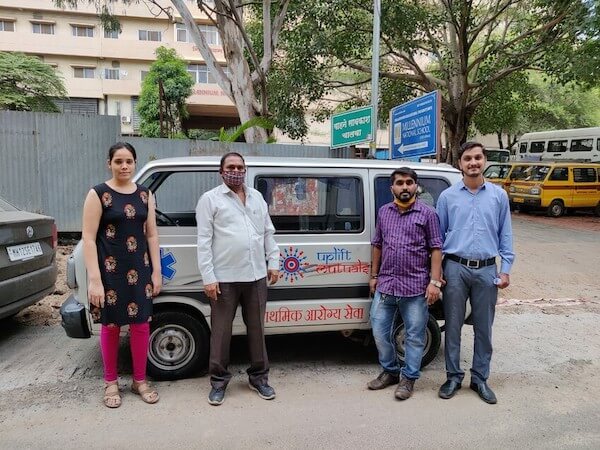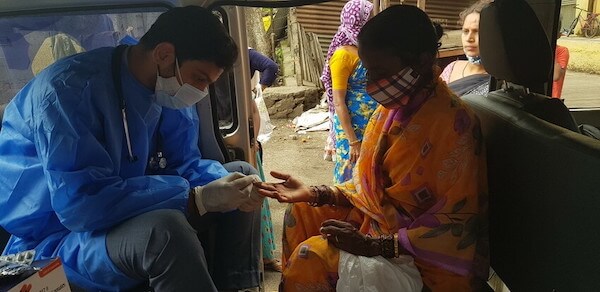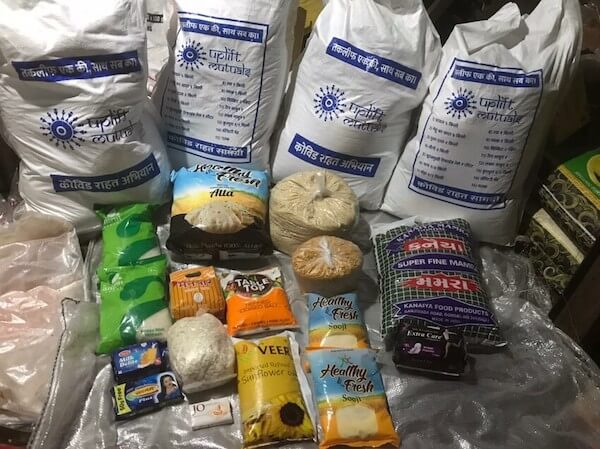When Shakuntala’s husband, who is a taxi driver, was stuck in Mumbai for an extended period during quarantine, she was locked down at home, struggling to feed her three children and elderly in-laws who live with her.
Since the beginning of the pandemic, 25% of adults in households with children worldwide have gone a day or more without food. And the World Bank estimates that an additional 75 million to 95 million individuals will be pushed back into extreme poverty because of the economic impact of the pandemic.

Like so many people in India, the pandemic was devastating Shankuntala’s community—economically, with regard to hunger, and with regard to health. Leaders on the ground noted, “Every person in India has been affected by the pandemic. Every person has lost at least one beloved friend or relative to the virus.” It is unlikely that published statistics even capture the entire picture.
Health is Essential
What is more apparent now than ever is that health is foundational to our success, development, and growth. In times of good health, we feel strong—ready to drive change, accomplish key milestones, and invest in transformation for ourselves and those around us.
But when we’re sick, it’s difficult to think about anything else.
All of our energy, time, and resources are poured into one goal: getting better.
For individuals living in extreme poverty around the world—people like Shakuntala; people who cannot miss a day of work or forgo a day’s wages—health is even more essential. When work is linked to survival, sick days are a luxury you simply don’t have. And when you don’t have financial resources, you can’t afford the health care you need to heal.
It’s a vicious cycle.
The World Bank describes the relationship between poverty and poor health this way: “Poverty is a major cause of ill health and a barrier to accessing health care when needed. This relationship is financial: the poor cannot afford to purchase those things that are needed for good health, including sufficient quantities of quality food and health care.” Poverty produces poor health outcomes, and subsequent bouts of illness, in turn, perpetuate poverty.
The Health and Economic Impact of COVID-19
The pandemic exacerbated these outcomes. There have been over 500 million cases of COVID-19 globally, and alongside growing case numbers, the number of individuals living in extreme poverty has also risen. COVID has wreaked havoc on our world and demonstrated just how closely health outcomes are linked to every facet of daily life, including education, sustainable livelihoods, mental health, and nutrition.
Here at Opportunity International, we know that a successful approach to poverty alleviation is a holistic one—one that must include careful attention to and solutions for poor health outcomes.
Responding to the COVID-19 Crisis in India
In the spring of 2021, when COVID-19 ravaged communities in India like Shakuntala’s, Opportunity International responded. While our traditional work is in financial services, our primary goal has always been to serve our clients—and at that moment, their immediate need was not accessing loans or building their business. Their immediate need was to stay alive.
Through our Rapid Response Fund, we distributed emergency food rations to vulnerable households, provided mass awareness messaging, partnered to provide emergency ambulance dispatch, offered rural villages telehealth options and psychological support, and facilitated over 41,000 vaccination camps and mobile vaccination vans through our local partners. Over 4.5 million people received vaccinations at our sites.

These dedicated efforts to produce positive, long-term health outcomes were not a departure from our mission and goals—rather, they worked in concert with our targeted microfinance work. Throughout the COVID-19 pandemic, Opportunity provided working capital to individuals attempting to sustain and revive their businesses that suffered from the pandemic. Additionally, Opportunity worked with clients like Shakuntala to find alternative income options for those who had lost their livelihoods altogether.
As a foundational need, health is a requirement for sustainable growth. It was our honor to serve clients with emergency programs through the pandemic, and it is our honor to invest in health through our day-to-day programs, too.

Long-term Health Care in India
When the most immediate risks has subsided and Shakuntala was able to leave her home, she decided to become a Community Health Facilitator. Using the information she had learned through training with Healing Fields, one of Opportunity International’s partners, she began educating her community about COVID prevention, hygiene, handwashing, and nutrition. She identified five very poor families led by single women in her village and ensured that rations reached these families, with the support of Healing Fields. They were able to eat healthy meals as a result of her intervention.

Shakuntala reached out to more than 200 families in her village with education on how to prevent COVID. “When I give awareness on the coronavirus to the community, many women tell me that the training I had given them earlier on hand washing, personal hygiene, and nutrition is very useful to them in the current situation. They are following those health practices, and it is helping them a lot now. This makes me feel proud of what I am doing as a CHF.”
In non-pandemic times, Community Health Facilitators like Shakuntala focus on menstrual health, nutrition, sanitation, prevention of illnesses, and hygiene practices. These women, who are trained and equipped to serve 200 families each, earn an income to help them support their families and serve as valuable resources for their communities.
Today, there are more than 4,000 Community Health Facilitators working in India.

Through the COVID-19 pandemic, we learned just how intertwined health outcomes are with poverty alleviation and international development. An individual’s health determines her work, and her ability to work transforms her life—and the life of her family and community. Now more than ever, we must incorporate health solutions—things like Rapid Response and the Community Health Facilitator program—into our work addressing extreme poverty.
Because an unhealthy person cannot build her future. An unhealthy person cannot care for her family well. An unhealthy person cannot thrive.
Health is foundational—and together, through strategic programs and community-led initiatives, we can keep people and communities healthy.


